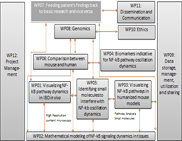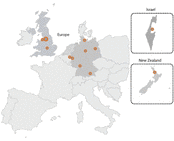Methodology, approach and technologies used
The translation of the consortiums basic finding happens in two stages. In the first stage the consortium use humanised mice in which the consortium can now analyse human gut tissue with cells of the human haematopoietic system together with lentil viral vector transduction of human NF-kappa-B proteins marked with fluorescence proteins. In these humanised mice the consortium can directly compare mouse and human tissue in the normal stage and after NF-kappa-B activation. This allows us a direct mouse/human comparison at the data level that is linked to the consortiums knowledge base allowing mouse/human comparison at the gene and the network level.
The second stage consists of translation is translating the basic findings to patients. Here the consortium start with historical data from patients with inflammatory bowel disease from Maastricht and have prepared the data for data mining. This will allow us to have an unbiased view on a large set of patient data. Using this information the consortium will reinvest the Montreal classification, the consortium search for pattern that might appear when analysing big data set and the consortium try to extract information to help in finding the course of the disease, of episodes of gut inflammation, about successful treatment regimes etc. This historical data is accompanied by the collection of new patient data in a standardised way. The analysis of the historical data will inform us what is the value of each data point collected and if there are ways to minimise the collection of information without losing resolution or power of prediction. This effort will lead to the best way to collect data in a way that is least invasive for the patients but most informative for the disease classifications.
Results so far
SysmedIBD so far has developed two BAC transgenic mouse lines with fluorescence marked proteins of the NF-kappa-B pathway. Using these lines the consortium obtained key information about the biology of the NF-kappa-B pathway dynamics that are new in the field, namely, NF-kappa-B oscillation can be observed in cells from the transgenic mice, the oscillation frequency is different in different cell types and not all cells respond to NF-kappa-B pathway triggers in the same way.
SysmedIBD has established a framework to perform systems medicine in the area of inflammatory bowel disease. This framework consists of BAC transgenic mice with fluorescence protein labelled NF-kappa-B proteins that allow us to visualise NF-kappa-B dynamics in mouse derived cell types, tissues and in in vivo microscopy. Based on the results so far SysmedIBD will focus on three cell types, monocytes/macrophages, and gut epithelia cells and, as a reference cell type, fibroblasts. With detailed analysis of these three cell types the consortium will understand the regulation of NF-kappa-B dynamics in healthy mice and in gut inflammation. Into this system the consortium currently introduce mutations that either inactivate an important negative regulator of inflammation, namely Interleukin-10 or a driver of NF-kappa-B activation, namely Interleukin-1. The consortium also crosses in three mutations of genes in the NF-kappa-B pathway known to lead to gut inflammation. At the end of the project the consortium will have a very good understanding of the NF-kappa-B pathway regulation in inflammatory bowel disease. Mathematical modelling of tissue supports this work by pathway analyses, by transcriptome analyses etc.
SysmedIBD has generated a list of potential biomarkers for disease severity based on the NF-kappa-B pathway analysis and the consortium will analyse such markers both in mice and men in order to better assess disease severity. By this the consortium would like to predict treatment outcome, one of which is treatment of patients with anti TNF antibodies. The consortium would like to be able to predict treatment outcome or development of treatment resistance as early as possible, saving on costs of a very successful treatment for only a subset of patients. The consortium have also developed ways to transfect human blood derived macrophages with lentil viral vectors and can study the NF-kappa-B dynamics in human blood derived macrophages directly from patients and controls. The consortium plans to simplify this method further so that the consortium can perform such analyses on a large subset of patients. Once the consortium has achieved this, the consortium will use this technology to study the outcome of patients that receive diets that should help patients with inflammatory bowel disease.




